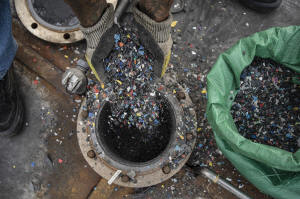Mexican startup tackles plastic waste by converting it to fuel
 Send a link to a friend
Send a link to a friend
 [February 01, 2025] By
ALBA ALEMÁN and FÉLIX MÁRQUEZ [February 01, 2025] By
ALBA ALEMÁN and FÉLIX MÁRQUEZ
BOCA DEL RIO, Mexico (AP) — A startup in Mexico is trying to help get a
handle on one Gulf coast city’s plastic waste problem by converting it
into gasoline, diesel and other fuels.
With less than 10% of the world’s plastics being recycled, Petgas’ idea
is that rather than letting discarded plastic become waste, it can
become productive again as fuel.
Petgas developed a machine in the port city of Boca del Rio that uses
pyrolysis, a thermodynamic process that heats plastics in the absence of
oxygen, breaking it down to produce gasoline, diesel, kerosene, paraffin
and coke.
Carlos Parraguirre Díaz, chief technology officer at Petgas, said that
in a week, the machine can process 1.5 tons of plastics and produce 356
gallons (1,350 liters) of fuel.
The process does require propane to initiate the heating, but once the
pyrolysis begins, the gas it produces is used to keep it going,
according to the company. And using fuel it produces does throw off
carbon dioxide, but the company says its net impact is less than
comparable fuels because their fuel is lower in sulfur.
Parraguirre Díaz said that the machine shows that “we can transform that
(plastic) into a product that’s useful and has high value in the world
economy.”

“In place of having a dump, it’s as if we dug into the earth and found
hydrocarbons that can be used by our community,” he said.
Global plastic production, already exceeding 400 million tons annually,
could surge by 70% by 2040 without policy changes, according to the
United Nations. China was by far the biggest exporter of plastic
products in 2023, followed by Germany and the United States.
Many plastics are used for packaging. Every day, the equivalent of 2,000
garbage trucks full of plastic are dumped into the world’s oceans,
rivers and lakes.
[to top of second column] |

Different types of plastic are seen inside Petgaserita, a
non-catalytic pyrolysis machine, which will be converted into fuel,
in Boca del Rio, Veracruz, Mexico, Jan. 4, 2025. (AP Photo/Felix
Marquez)
 Negotiations on a treaty to end
plastic pollution concluded in Busan, South Korea in December
without reaching an agreement. This was supposed to be the fifth and
final round to produce the first legally binding treaty on plastics
pollution, including in the oceans, by the end of 2024.
Petgas envisions a circular economy where plastic is no longer
waste, but rather a resource for the production of energy.
To that end, the company has organized plastic collection drives to
remove bottles and other material from the city’s beaches. It
encourages people to bring plastic waste to a drop-off point and
receives most of its material clean and shredded from a recycler.
Alexa Mendoza, a biologist specializing in plastic contamination of
the sea who is not involved in the project, said Petgas plan was a
good initiative, but a “band-aid” for a massive global problem.
“It doesn’t seem to me a solution to put a band-aid on it and say,
‘great, it’s solved and let’s do it,’ but rather it could be a first
step,” Mendoza said. “From there, with the help of scientists you
could take into account what needs to be adjusted so that it doesn’t
become another source of pollution."
For now, Petgas donates the fuel it produces to the local fire
department and food delivery services.
"The future is being able to really take production to a scale that
has impact,” said Parraguirre Díaz.
All contents © copyright 2025 Associated Press. All rights reserved |